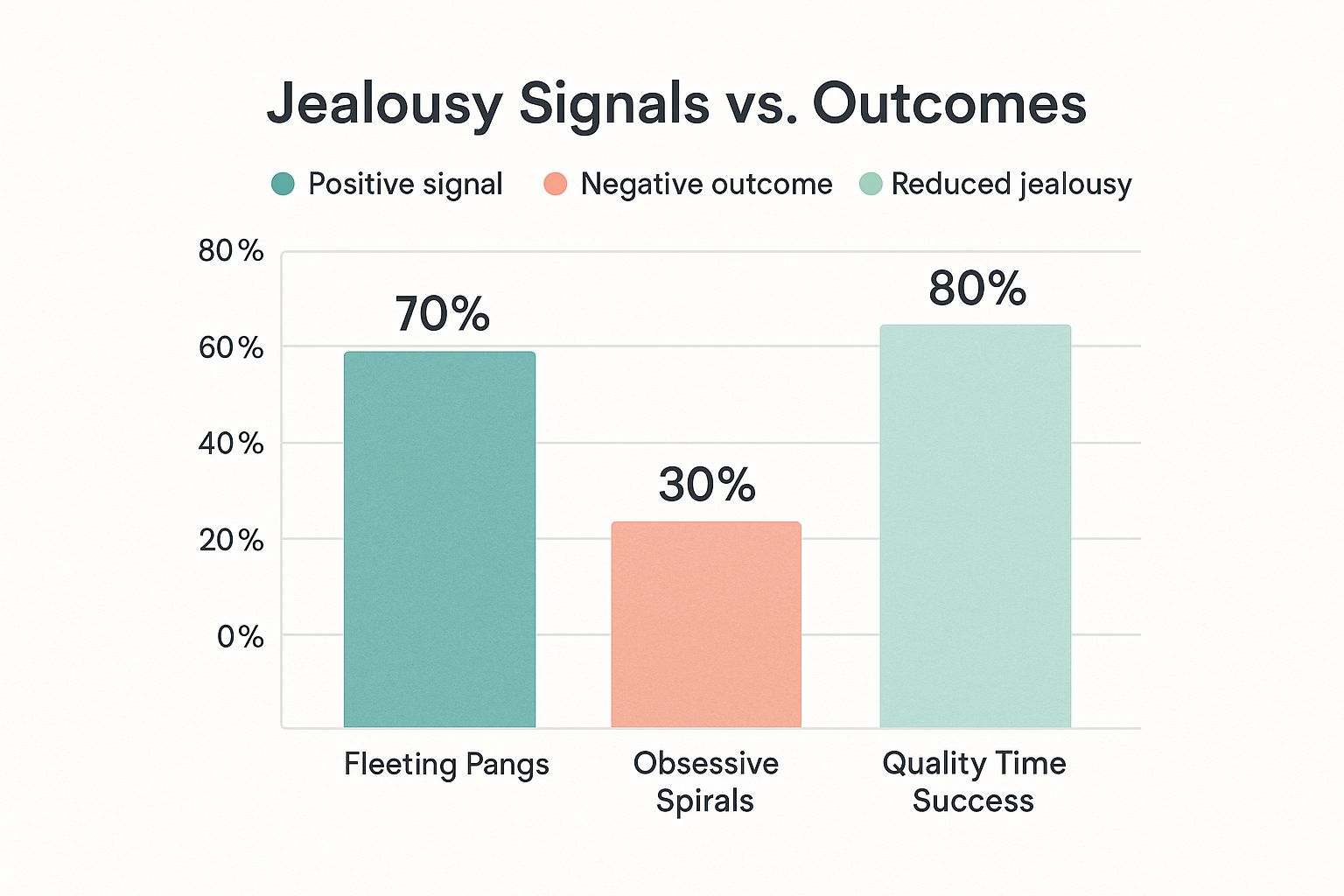To really get a handle on jealousy, you first have to look inward. The real source often has very little to do with what your partner is actually doing and everything to do with your own insecurities, past heartbreaks, or ingrained attachment styles. Figuring out your specific triggers is the first, most critical step toward managing these feelings and building a much stronger, more secure relationship.
Finding the Real Source of Your Jealousy

Before you can tackle jealousy, you have to get honest with yourself. That tight, anxious knot you feel in your stomach when your partner likes a coworker’s photo? It’s not just about that one click. It’s a flare-up, a reaction fueled by much deeper emotions and old programming. Any effective strategy for dealing with jealousy starts right here, with self-awareness.
This means you have to play detective with your own feelings. Instead of flying off the handle, take a breath. Pause. Ask yourself what’s really going on beneath the surface. Pinpointing the exact moment that green-eyed monster showed up is the key to unlocking everything.
Identifying Your Personal Triggers
What specific event set you off? Was it seeing your partner laugh a little too hard at someone else's joke, or did your stomach drop when they mentioned an ex's name? Triggers are deeply personal, and they almost always connect back to old wounds or current insecurities.
See if any of these common scenarios feel a little too familiar:
- Social Media Shenanigans: Your partner follows a new, attractive person or seems to be commenting on one person's posts a lot.
- Ghosts of Relationships Past: They bring up a fond memory with an ex, and suddenly you feel like you’re in a competition you didn't sign up for.
- The Party Problem: They get caught up in a long conversation with someone at a party, and you’re left feeling like a wallflower.
- Radio Silence: They take way longer than usual to text back, and your mind immediately jumps to the worst-case scenario.
These situations can feel like a direct threat, but more often than not, they're neutral events that we filter through the lens of our own personal history. If you're constantly asking, "why do I get jealous when my boyfriend talks to another girl?", digging into these triggers can bring some much-needed clarity.
The goal here isn't to blame your partner for making you feel this way. It's about getting curious and understanding why certain actions hit you so hard. This simple shift in perspective moves you from a place of control to one of genuine curiosity.
Connecting Jealousy to Deeper Roots
A huge piece of this puzzle often comes down to our attachment styles in relationships, which are basically the blueprints for how we behave in relationships, formed way back in our past. If you've been in relationships where trust was shattered, it’s only natural that you might be on high alert for history to repeat itself.
Attachment anxiety, in particular, which is often tied to low self-worth and a deep-seated fear of being abandoned, is a major predictor of intense jealousy. In fact, recent research confirms that people with higher attachment anxiety are way more likely to monitor their partner's social media and have much stronger jealous reactions to what they find.
This insight is powerful. It shows us that jealousy is rarely just about what’s happening in the here and now. It’s an echo from the past. Recognizing this connection is the first real, meaningful step toward healing and building a relationship on a foundation of security and trust.
Learning to See Jealousy Differently
That familiar, sinking feeling of jealousy is never fun. But what if it isn’t just a negative emotion you have to crush? Shifting your perspective on this can be a total game-changer.
Sometimes, jealousy is just a flashing light on your relationship's dashboard. It's signaling how deeply you value your partner and the connection you share.
Instead of seeing it as a personal flaw or a sign of weakness, try to view it as proof of your emotional investment. The real skill is learning how to deal with relationship jealousy constructively. Is this a fleeting pang that reminds you to reconnect, or is it an obsessive spiral that’s only going to push your partner away?
The Signal Versus the Threat
Knowing the difference is absolutely crucial. A healthy response uses that initial green-eyed monster as a prompt for positive action. For instance, if you feel a touch of jealousy seeing your partner having a blast with their friends, you could reframe it. See it as a simple reminder to plan a fun date night for just the two of you.
An unhealthy reaction, on the other hand, lets that feeling fester into accusations or controlling behaviors. This is where the damage happens. You turn a simple emotional signal into a genuine threat to your bond. One path strengthens your connection, while the other erodes it completely.
The chart below shows how these jealousy signals can lead to very different outcomes, highlighting how well channeling these feelings into positive action actually works.

The data speaks for itself. While obsessive spirals are a real risk, intentionally investing in quality time is an overwhelmingly effective way to calm down those jealous feelings.
Harnessing Jealousy for Good
When you learn to manage it, jealousy can actually highlight the intensity of your emotional attachment. It's not always about insecurity; it can be an extension of profound love.
In fact, one study found a direct link between feelings of jealousy and stronger sensations of being in love and attached to a partner. This suggests the emotion itself isn’t the enemy—it’s how you act on it that counts. You can read the full research on how jealousy and love intertwine to see the data for yourself.
To help you spot the difference in your own reactions, here’s a quick comparison of what healthy versus unhealthy responses to jealousy look like.
Healthy vs Unhealthy Expressions of Jealousy
| Healthy Response (Signal) | Unhealthy Behavior (Threat) |
|---|---|
| Voicing your feelings calmly: "I felt a little left out when…" | Making accusations: "You're always flirting with other people." |
| Suggesting quality time together. | Demanding your partner stop seeing friends. |
| Asking for reassurance in a non-blaming way. | Checking their phone or social media behind their back. |
| Acknowledging your feelings without letting them dictate your actions. | Giving the silent treatment or starting arguments. |
Seeing the patterns laid out like this can be an eye-opener. It helps you recognize when you're using jealousy as a productive signal versus letting it become a destructive threat to your relationship.
Key Takeaway: Jealousy can be an alarm bell, not a fire. It alerts you to a potential emotional need—like a need for reassurance or quality time—that you and your partner can address together before it grows into a real problem.
This kind of reframing is especially powerful if you know you're prone to worry. Recognizing the signs of an anxious attachment style within yourself can provide crucial context for why these feelings hit so intensely.
If you want to dig deeper, our detailed guide on the common symptoms of an anxious attachment style can be really helpful. By understanding where these feelings come from, you can start redirecting that energy toward actions that build security instead of sowing distrust.
How to Talk About Jealousy Without Starting a Fight

Let’s be real: bringing up jealousy can feel like walking through a minefield. The way you start the conversation can either build a bridge or throw up a wall.
It’s one of the trickiest parts of handling jealousy because it’s so easy to slip into accusation mode. But the goal here isn’t to win an argument. It’s about working together, building empathy, and ultimately, making your connection stronger.
Remember, your partner isn't the enemy; they're your teammate. Shifting your mindset from confrontation to collaboration is everything. It turns a potential fight into a problem-solving session where you're both on the same side, trying to strengthen your bond.
Frame the Conversation with "I Feel" Statements
This is probably the single most powerful shift you can make. Ditch the blame-filled "you" statements and start using "I feel" statements instead. Accusatory language is like a conversation killer—it instantly puts your partner on the defensive and shuts down any hope of a productive chat.
Instead of saying, "You make me jealous when you talk to them," which is a direct attack, try framing it from your perspective. Something like, "I feel insecure and a little anxious when I see you texting them so much. It brings up some old fears for me."
See the difference? This simple switch accomplishes two huge things:
- It shows you're taking ownership of your emotions, recognizing that they’re coming from inside you.
- It invites your partner to understand what you're experiencing, not just defend what they did.
This approach is a cornerstone of healthy emotional expression. If you want to dive deeper, exploring different ways to communicate effectively with your partner can build a solid foundation for all of your tough conversations.
Let’s try a real-world scenario: Imagine your partner spent a long time chatting with someone attractive at a party.
- Blaming Approach: "You were flirting with that person all night and completely ignored me."
- Constructive Approach: "I felt really alone and insecure at the party earlier when you were in that long conversation. It made me feel disconnected from you."
Choose the Right Time and Place
Timing is everything. Seriously. Trying to talk about sensitive feelings when one of you is stressed, hungry, tired, or distracted is a recipe for disaster. Never, ever start this conversation in the heat of the moment or right as you're about to go to sleep.
Instead, be intentional. Pick a time when you’re both calm, rested, and can give the conversation your full, uninterrupted attention.
This might sound like saying, "Hey, there's something on my mind I'd love to talk about when we both have some free time. Are you free after dinner tonight?"
Creating this safe space shows respect for your partner and the topic itself. It signals that you want to connect, not just complain. When you handle these moments with care, you turn vulnerability into an opportunity for real intimacy, building a relationship where it's safe to be honest—and that’s the ultimate antidote to jealousy.
Actionable Ways to Manage Jealous Thoughts

When jealous thoughts start to bubble up, it feels like getting caught in a storm of worst-case scenarios. That gut-wrenching feeling can take over fast, making it almost impossible to think straight. The trick is to have a few go-to techniques ready to ground yourself before your emotions start calling the shots.
These strategies aren't about bottling up what you feel. It's the opposite. They empower you to observe your feelings without getting swept away, calming your nervous system so you can respond with a clear head instead of reacting out of fear.
Get Real with Reality Testing
One of the best tools for pulling yourself out of a jealousy spiral is reality testing, a technique that comes straight from cognitive-behavioral therapy. It’s a simple but powerful process of questioning the "evidence" your anxiety is throwing at you. Your mind might be spinning a dramatic story, but is any of it actually based on facts?
Let’s say your partner doesn't text you back for two hours. Your jealous brain immediately jumps to conclusions: "They're ignoring me," or "They must be with someone else."
Reality testing is about hitting the pause button on that narrative and considering other, far more likely explanations.
- Could they be in a meeting with their phone silenced?
- Are they driving or running errands?
- Did their phone die, or are they just busy with a task that needs their full attention?
This practice breaks the cycle of negative assumptions. It trains your brain to stop and look for rational alternatives instead of immediately buying into the most painful story. It puts you back in the driver's seat of your own thoughts.
By actively challenging your initial jealous reaction, you create a crucial gap between feeling an emotion and acting on it. This space is where you reclaim your power and prevent small insecurities from blowing up into major conflicts.
Use Mindfulness to Stay in the Moment
Mindfulness is all about anchoring yourself in the here and now, which is the perfect antidote to jealousy’s habit of dragging you into anxious "what-if" futures. When your mind is racing, a simple grounding exercise can pull you right back to the present moment.
A super easy and effective one is the 5-4-3-2-1 method. The next time you feel that jealous pang, just pause and identify:
- 5 things you can see around you.
- 4 things you can physically feel (the chair under you, the texture of your jeans).
- 3 things you can hear.
- 2 things you can smell.
- 1 thing you can taste.
This little exercise forces your brain to shift focus to your immediate sensory experience, yanking it away from the anxious story it was building. It's a quick, discreet way to calm yourself down, no matter where you are.
Beyond these in-the-moment strategies, taking care of your own mental well-being is a huge piece of the puzzle. Exploring different therapeutic activities for mental health and well-being can give you more tools to manage difficult thoughts and emotions. Building this kind of personal resilience makes you less vulnerable to jealousy's grip in the first place, benefiting both you and your relationship.
Fortifying Your Relationship Against Jealousy
While talking through your feelings and managing your thoughts are crucial tools, the best long-term strategy for dealing with jealousy is to play offense, not defense. It’s all about building a bond so strong and secure that jealousy struggles to find any cracks to seep into.
Think of it like building a fortress. You’re not just reacting to attacks; you're proactively strengthening the walls. This means consistently investing in the health of your relationship through intentional, ongoing effort from both partners. When you actively work on your connection, you create an environment where you both feel seen, valued, and fundamentally safe.
Prioritize Intentional Quality Time
In the hustle of modern life, it's easy to let "time together" become background noise—scrolling on your phones in the same room isn't exactly deep connection. The key is creating non-negotiable quality time where you're both fully present and engaged with each other.
This doesn't have to be complicated. It could look like:
- A weekly date night where phones are off-limits.
- A 15-minute check-in every evening to share the highs and lows of your day.
- Starting a shared hobby that requires you to work together, like cooking a new recipe or tackling a puzzle.
The activity itself matters less than the intention behind it. This consistent effort sends a powerful message: "You are my priority." It builds a reservoir of positive experiences and trust that you can draw on whenever insecurity pops up.
True emotional intimacy is the ultimate antidote to jealousy. When you feel deeply connected and understood by your partner, the threat of an outsider feels far less significant.
It's also interesting to see how culture plays a role. A study involving 265 participants from Chile and Spain found that jealousy levels and their link to intimacy can differ across cultures. While building a strong bond is a universal strategy, how jealousy is perceived and felt can vary. You can discover more insights about these cultural findings here.
Co-Create Your Relationship Boundaries
Boundaries get a bad rap. They aren't about restricting your partner; they’re about co-creating a set of guidelines that make you both feel secure. Talking openly about what makes each of you feel respected and safe is one of the most powerful things you can do to jealousy-proof your relationship.
This isn’t about forbidding friendships. It’s about defining what feels right for your unique partnership. For instance, you might agree on boundaries around how you interact with ex-partners on social media or how much detail about your relationship you share with friends.
The magic word here is together. When boundaries are a team decision, they build trust instead of resentment. You're both working from the same playbook to protect your connection, which is a massive win against insecurity.
Common Questions About Relationship Jealousy
Even when you're committed to working through jealousy, some situations just feel… sticky. It's totally normal to hit a wall or have specific questions pop up as you navigate these tricky feelings.
Let's break down some of the most common questions that come up when people are learning to manage jealousy in their relationships.
Is a Little Jealousy Healthy in a Relationship?
Honestly, a tiny bit of jealousy can be normal. It often just means you care deeply about your partner and you value what you have together. The real test isn't the feeling itself, but how you react to it.
A fleeting pang of jealousy that makes you think, "Hey, we should plan a date night soon," is a world away from possessive behavior that sparks a fight.
Think of it this way: healthy jealousy is a quiet internal nudge to nurture your connection. Unhealthy jealousy is a loud, anxious voice that demands control and thrives on distrust.
The emotion isn't the real problem—it's what you do with it that counts. A moment of insecurity can actually bring you closer if you use it as a chance to connect, not to control.
How Can I Stop Checking My Partner's Phone or Social Media?
This is a tough one, because the urge to check comes from a desperate need for reassurance. But it always backfires, chipping away at the very trust you're trying to find. The first step is admitting to yourself that this behavior hurts everyone involved—it breaks your partner's trust in you, and it breaks your own trust in yourself to handle uncertainty.
When you feel that impulse creeping in, stop and ask yourself what triggered it. Was it a specific notification? A late text? Or just a free-floating anxiety that latched onto their phone?
Instead of grabbing their device, try an in-the-moment grounding technique to break the cycle:
- Breathe Deeply: Seriously. Take five slow, deep breaths. It calms your nervous system down almost instantly.
- Challenge the Story: Your anxiety is telling you a story. What is it? Now, what are a few other, more logical explanations for what's happening?
- Redirect Yourself: Put your phone down, walk into another room, and do something else for at least 15 minutes. Read a book, do the dishes, stretch—anything to shift your focus.
The goal here is to short-circuit that compulsive loop. You want to move your energy away from detective work and toward building real trust through honest conversations about how you're feeling.
What if My Partner Says My Jealousy Is My Problem?
That stings. While it's true that you're responsible for your own feelings, a partnership is a team sport. Feeling completely dismissed by your partner when you're vulnerable is incredibly isolating.
The best way forward is to frame the conversation around your feelings, using "I feel" statements. This explains your experience without assigning blame. For example, instead of, "You never text me back, and it makes me jealous," you could try, "When I don't hear from you for a while, I start to feel insecure and disconnected."
If they're still unwilling to talk about boundaries, offer some reassurance, or even just acknowledge how their actions play a part in the dynamic, it could point to bigger issues. At that point, bringing in a couples counselor might be the best step to help you both learn to communicate more productively.
At Poke Match, we get it. We provide empathetic support and real-world strategies to help you build stronger, healthier connections. Explore our resources to navigate your relationship journey with more confidence. Learn more about how we can help.
